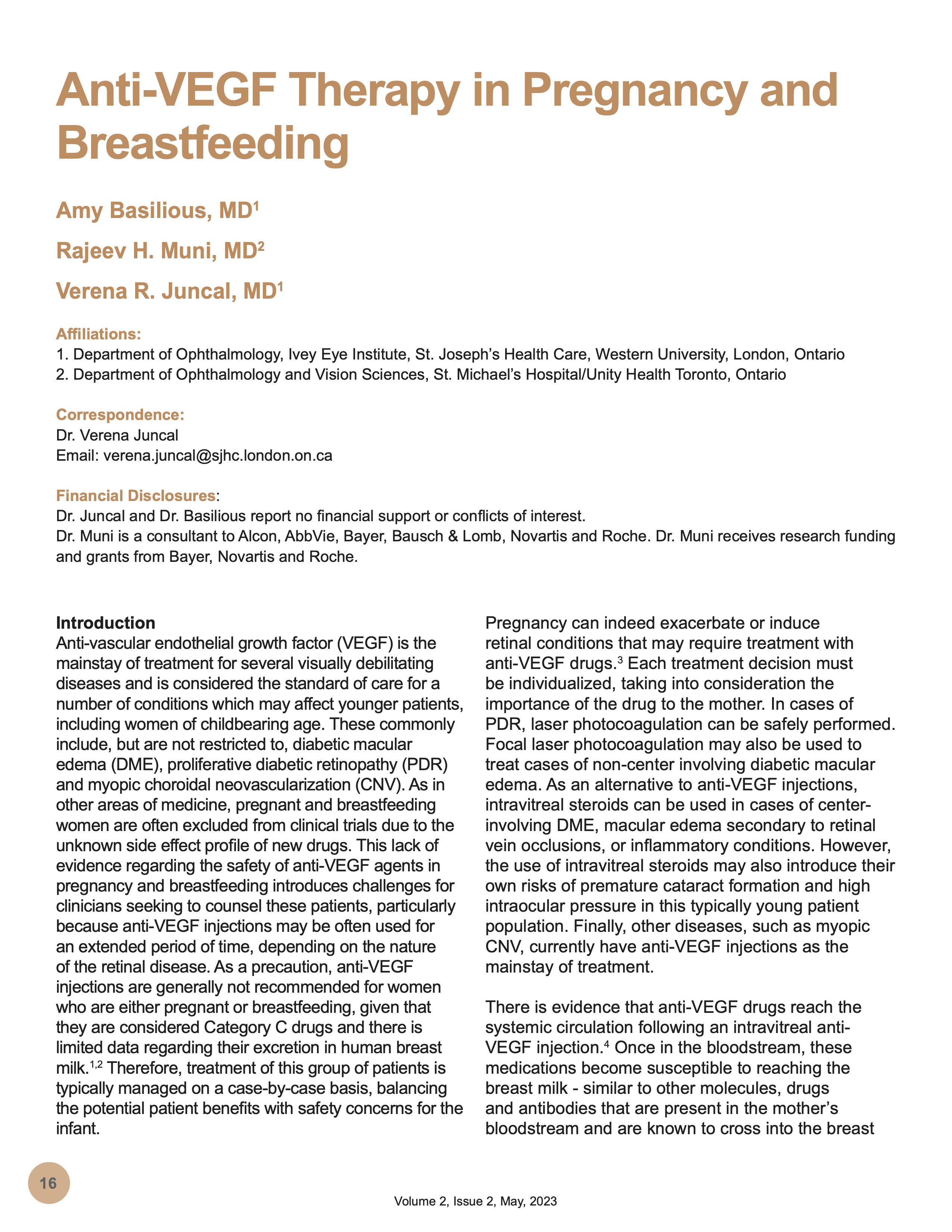Anti-VEGF therapy in pregnancy and breastfeeding
DOI:
https://doi.org/10.58931/cect.2023.2227Abstract
Anti-vascular endothelial growth factor (VEGF) is the mainstay of treatment for several visually debilitating diseases and is considered the standard of care for a number of conditions which may affect younger patients, including women of childbearing age. These commonly include, but are not restricted to, diabetic macular edema (DME), proliferative diabetic retinopathy (PDR) and myopic choroidal neovascularization (CNV). As in other areas of medicine, pregnant and breastfeeding women are often excluded from clinical trials due to the unknown side effect profile of new drugs. This lack of evidence regarding the safety of anti-VEGF agents in pregnancy and breastfeeding introduces challenges for clinicians seeking to counsel these patients, particularly because anti-VEGF injections may be often used for an extended period of time, depending on the nature of the retinal disease. As a precaution, anti-VEGF injections are generally not recommended for women who are either pregnant or breastfeeding, given that they are considered Category C drugs and there is limited data regarding their excretion in human breast milk. Therefore, treatment of this group of patients is typically managed on a case-by-case basis, balancing the potential patient benefits with safety concerns for the infant.
References
Lucentis™ (ranibizumab injection) Product Monograph. Novartis Pharmaceuticals Canada, 2015.
Eylea™ (aflibercept injection) Product Monograph. Bayer Inc., 2013.
Rosenthal JM, Johnson MW. Management of retinal diseases in pregnant patients. Journal of Ophthalmic & Vision Research. 2018 Jan;13(1):62. DOI: https://doi.org/10.4103/jovr.jovr_195_17
Avery RL, Castellarin AA, Steinle NC, Dhoot DS, Pieramici DJ, See R, Couvillion S, Ma'an AN, Rabena MD, Le K, Maia M. Systemic pharmacokinetics following intravitreal injections of ranibizumab, bevacizumab or aflibercept in patients with neovascular AMD. British Journal of Ophthalmology. 2014 Dec 1;98(12):1636-41. DOI: https://doi.org/10.1136/bjophthalmol-2014-305252
Ferrara N. Role of vascular endothelial growth factor in regulation of physiological angiogenesis. American Journal of Physiology-Cell Physiology. 2001 Jun 1;280(6):C1358-66. DOI: https://doi.org/10.1152/ajpcell.2001.280.6.C1358
Galazios G, Papazoglou D, Tsikouras P, Kolios G. Vascular endothelial growth factor gene polymorphisms and pregnancy. The Journal of Maternal-Fetal & Neonatal Medicine. 2009 Jan 1;22(5):371-8. DOI: https://doi.org/10.1080/14767050802645035
Granger JP. Vascular endothelial growth factor inhibitors and hypertension: a central role for the kidney and endothelial factors? Hypertension. 2009 Sep 1;54(3):465-7. DOI: https://doi.org/10.1161/HYPERTENSIONAHA.109.132274
Polizzi S, Mahajan VB. Intravitreal anti-VEGF injections in pregnancy: case series and review of literature. Journal of Ocular Pharmacology and Therapeutics. 2015 Dec 1;31(10):605-10. DOI: https://doi.org/10.1089/jop.2015.0056
Siafakas CG, Anatolitou F, Fusunyan RD, Walker WA, Sanderson IR. Vascular endothelial growth factor (VEGF) is present in human breast milk and its receptor is present on intestinal epithelial cells. Pediatric Research. 1999 May;45(5):652-7. DOI: https://doi.org/10.1203/00006450-199905010-00007
Vuorela P, Andersson S, Carpén O, Ylikorkala O, Halmesmäki E. Unbound vascular endothelial growth factor and its receptors in breast, human milk, and newborn intestine. The American Journal of Clinical Nutrition. 2000 Nov 1;72(5):1196-201. DOI: https://doi.org/10.1093/ajcn/72.5.1196
Nishimura S, Maeno N, Matsuo K, Nakajima T, Kitajima I, Saito H, Maruyama I. Human lactiferous mammary gland cells produce vascular endothelial growth factor (VEGF) and express the VEGF receptors, Flt-1 AND KDR/Flk-1. Cytokine. 2002 May 1;18(4):191-8.
Ozgurtas T, Aydin I, Turan O, Koc E, Hirfanoglu IM, Acikel CH, Akyol M, Serdar M, Erbil KM. Soluble vascular endothelial growth factor receptor 1 in human breast milk. Hormone Research in Paediatrics. 2011;76(1):17-21. DOI: https://doi.org/10.1159/000324057
Nishimura S, Maeno N, Matsuo K, Nakajima T, Kitajima I, Saito H, Maruyama I. Human lactiferous mammary gland cells produce vascular endothelial growth factor (VEGF) and express the VEGF receptors, Flt-1 AND KDR/Flk-1. Cytokine. 2002 May 1;18(4):191-8. DOI: https://doi.org/10.1006/cyto.2002.1032
Morin J, Luu TM, Superstein R, Ospina LH, Lefebvre F, Simard MN, Shah V, Shah PS, Kelly EN, Canadian Neonatal Network, Canadian Neonatal Follow-Up Network Investigators. Neurodevelopmental outcomes following bevacizumab injections for retinopathy of prematurity. Pediatrics. 2016 Apr 1;137(4). DOI: https://doi.org/10.1542/peds.2015-3218
Tinning AR, Jensen BL, Johnsen I, Chen D, Coffman TM, Madsen K. Vascular endothelial growth factor signaling is necessary for expansion of medullary microvessels during postnatal kidney development. American Journal of Physiology-Renal Physiology. 2016 Sep 1;311(3):F586-99. DOI: https://doi.org/10.1152/ajprenal.00221.2016
Thébaud B, Abman SH. Bronchopulmonary dysplasia: Where have all the vessels gone? Roles of angiogenic growth factors in chronic lung disease. Am J Respir Crit Care Med. 2007; 175(10):978–985. DOI: https://doi.org/10.1164/rccm.200611-1660PP
McFarland TJ, Rhoads AD, Hartzell M, Emerson GG, Bhavsar AR, Stout JT. Bevacizumab levels in breast milk after long-term intravitreal injections. Retina. 2015 Aug 1;35(8):1670-3. DOI: https://doi.org/10.1097/IAE.0000000000000517
Juncal VR, Paracha Q, Bamakrid M, Francisconi CL, Farah J, Kherani A, Muni RH. Ranibizumab and aflibercept levels in breast milk after intravitreal injection. Ophthalmology. 2020 Feb 1;127(2):278-80. DOI: https://doi.org/10.1016/j.ophtha.2019.08.022

Downloads
Published
How to Cite
Issue
Section
License
Copyright (c) 2023 Canadian Eye Care Today

This work is licensed under a Creative Commons Attribution-NonCommercial-NoDerivatives 4.0 International License.
